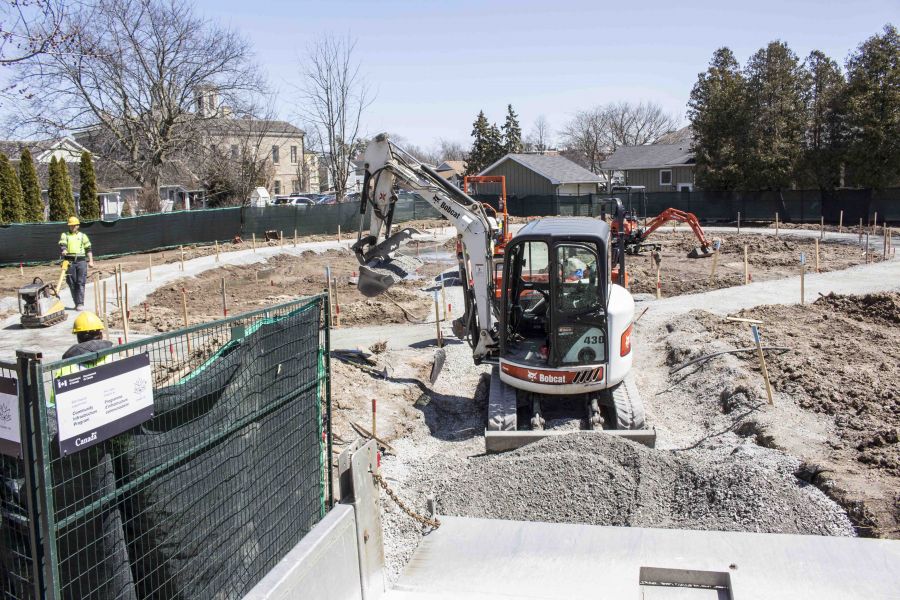During the many occasions when the public was asked about the future of the former lawn bowling greenspace on Regent Street, one concept was repeatedly mentioned – that it should honour and celebrate the town's black history.
In September, the Voices of Freedom Park will officially open to recognize Niagara-on-the-Lake's early black settlers and their contribution to the history not just of this community, but of our country.
It's not only a celebration of the past, said Betty Disero, chair of the Regent Street Park committee working on the project, but contains an educational component that is intended to help guide the future.
The design encompasses the entire park, with a path at its entrance bordered by benches and winding its way through to a communal circle. Along the way a downloaded app will tell the stories of four black people who helped shape the town of Niagara-on-the-Lake, said Disero.
One of the voices is that of Cloe Cooley, a slave who was brought across the river in 1793 by her owner, who intended to sell her. Her resistance was witnessed by an outraged community, leading to the introduction of legislation forbidding the importation of new slaves and the eventual abolition of slavery, as well as opening the doors to the Underground Railroad coming to Canada.
Also heard will be the stories of Richard Pierpoint, his establishment of a corps of Black soldiers, and its influence on the outcome of the War of 1812, and Solemen Moseby, who escaped slavery in Kentucky to come to Niagara, and was tried and found guilty of stealing his master's horse. He was set to be extradited while being kept prisoner in the Niagara Court House. A riot broke out when black men and women blocked the jailhouse, and he escaped. He was eventually able to live in freedom in Niagara.
The Waters family of settlers who established roots in the community in 1794 provide the fourth voice. Members of the family received land grants, fought in the War of 1812, rebuilt houses and farms after the war, and were members of St. Mark's Church. John Waters was a Town councillor for six years.
The park has been designed by Raymond Tung, an urban design specialist working for the Town planning department, and the installation that provides the experience, called the Rite of Passage, which helps tell the story, is by Tom Ridout, a Toronto artist who was worked on the Queenston Heights memorial that recognizes the contributions of the Aboriginals who fought in the War of 1812.
The property has been in public hands since 1803, when it was acquired by the government of Upper Canadian, and was the site where General Sir Isaac Brock and Colonel John MacDonnell lay in state after being killed in the War of 1812.
It has been the property of the Town since the 1850s, and was rezoned by the previous council for residential development after the site was no longer required by the town's lawn bowling club. The current council stepped in to retain it for public use, and from there, the concept of the Voices of Freedom Park was developed.
Coun. John Wiens and committee co-chair John Hawley were charged with raising $670,000 to finance it, and have done so, thanks to a generous grant from the federal government and the public opening their wallets, said Disero. The land remains a Town park and maintenance will be the responsibility of the parks and recreation department.
“We have all the money we need and we're moving right ahead,” said Disero, although there is an additional amount being raised from the public to cover the educational component, which is being managed by the Niagara Historical Museum.
Black historian Wilma Morrison is also a committee member and honorary chair.
“We've had a lot of fantastic people on our committee,” said Disero, “and they've done some great work. It will be a fantastic park.”
The park, and the committee that has been working on it, came about as a legacy project of the Communities in Bloom committee, which Disero also chairs. The future of the Regent Street property was one of the first initiatives the Communities in Bloom committee looked at, in addition to creating a pedestrian-friendly four corners area of St. Davids, and a garden at Navy Hall in partnership with Parks Canada. The committee remains active, and has a list of projects to continue working on which can earn the town Communities in Bloom recognition while showcasing what's best about NOTL, including volunteerism and winter life, Disero said.
“We're keeping our foot in the door, recognizing the best qualities of our town. We can do that with the Regent Street park as well,” said Disero.
“I strongly believe these projects help us to come together as one community, with everyone working to help everyone in different areas, united for the betterment of the community.”










